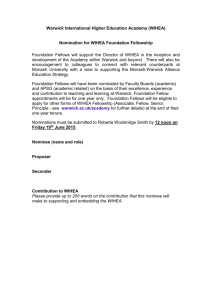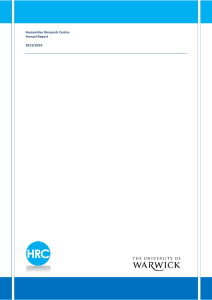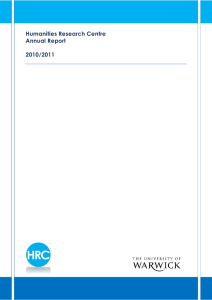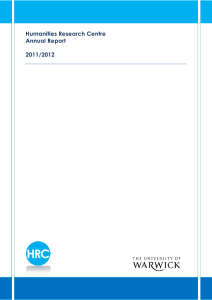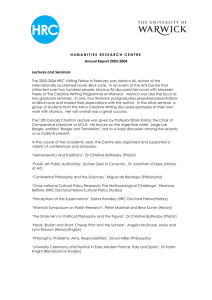Humanities Research Centre Annual Report 2012/2013
advertisement
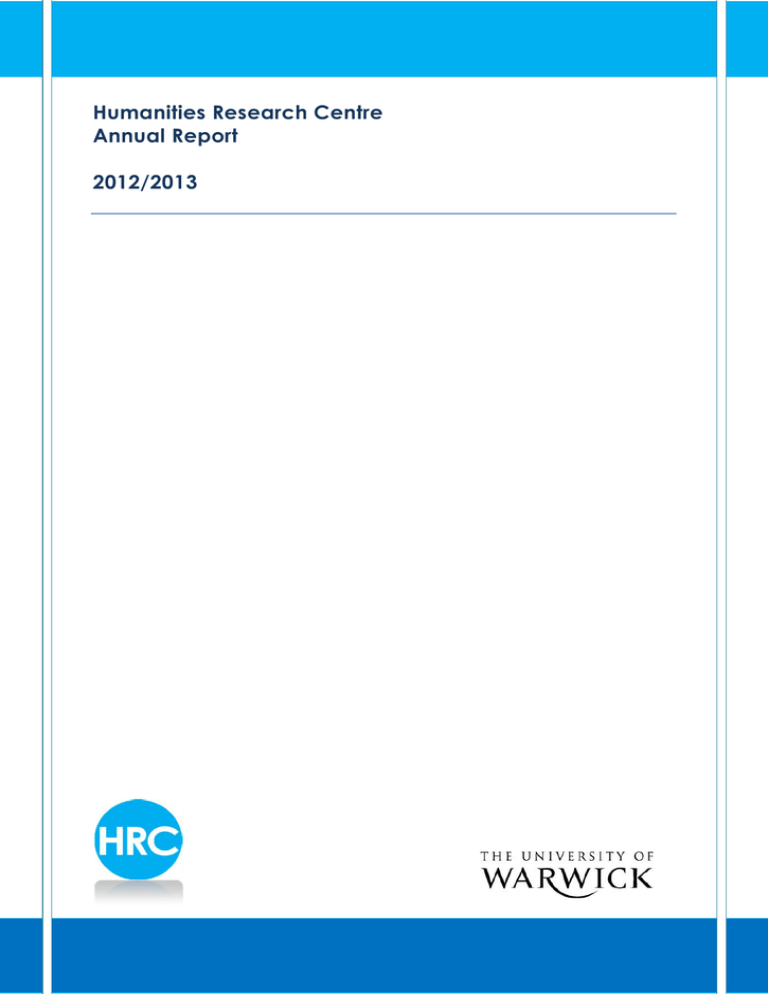
Humanities Research Centre Annual Report 2012/2013 In the course of the academic year, the Centre organised and supported a variety of conferences, lectures, seminars, and other events: Myth-Making: From Medusa to Madonna Domestic dissidents Parish Research Symposium Readers and Spectators in Italy: Towards the Formation of a National Audience (1750-1890) Roberto Bolaño and World Literature Theatre at the Crossroads of Language and Genre Living in Violent Times Scientiae 2013: Disciplines of Knowing in the Early Modern World Erotica, Pornography and the Obscene in Europe Making Space for Festival, 1400-1700: Interactions of Architecture and Performance in Late Medieval and Early Modern Festivals Planetary Cancer: Growth, Economy and Culture in an Era of Climate Catastrophe What is old age? New perspectives from the Humanities Bond@50: The Work of Edward Bond Shared Visions II Beckett and Brain Science Contested Words: The Digital Analysis of Early Modern Texts Workshop Bernard Stiegler - ‘General Organology, Digital Studies and the Neurosciences’ The Struggle of Creation: Rethinking Michelangelo’s Poetry Oliver Sacks – ‘Awakenings’ A screening of the 1974 Yorkshire Television documentary followed by a post screening discussion Donald Charlton Lecture Professor Cary Wolfe (Rice University) 'The Biopolitics of Human and Animal Bodies' Visiting Fellow Roberto Tejada (Meadows School of the Arts, Southern Methodist) 'Everything I See Needs Rearranging: Media and Experience in Los Angeles, 1965' The HRC continues to support interdisciplinary arts and humanities research in a variety of ways. Eighteenth Century Seminar Programme of Events Perry Gauci (Oxford) - “An Empire of Liberty: the Spanish town Affair 1754-8” Mary-Ann Constantine (Aberystwyth) - 'The Welsh in Revolutionary Paris' Tim Clayton (Independent scholar) - 'Printed Portraits of Kitty Fischer and other Ladies of Pleasure in mid-eighteenth century London' Clark Library, Los Angeles - a joint Warwick-UCLA conference 'Rethinking Enlightenment 1650-1800'. Felicity James (Leicester) - "Anna Laetitia Barbauld and voices of Dissent in 'Eighteen Hundred and Eleven'" Warwick-QM workshop on Friendship - the first of two interdisciplinary joint workshops. Harry Smith (Oxford), 'An Improving Elite? Governing an industrial town, Birmingham, 1769-1838' Dr Renaud Morieux (University of Cambridge),‘The Forced Migrations of British and French Prisoners of War in the Eighteenth Century’ Warwick-QM workshop on Friendship – 2nd workshop Annual Warwick-Birmingham workshop on the theme of 'heritage' Sidelights on Shakespeare – Seminar Series Sidelights on Shakespeare is an interdisciplinary seminar series which seeks to explore the work of William Shakespeare from non-literary/ theatrical perspectives. Sidelights was founded in 2010 by two doctoral English students at the University of Warwick and has since brought together scholars from a variety of research areas to investigate the importance of Shakespeare’s work Speakers this year: Dr. Erin Sullivan (The Shakespeare Institute) and Dr Paul Prescott (Warwick) – ‘The Year of Shakespeare,’ an online forum connected the World Shakespeare Festival (WSF) of 2012. Dr. Paul Botley (Warwick) led a round table discussion on the use of archives in literary and historical research. Professor Ewan Fernie (The Shakespeare Institute) - ‘Why Celebrate Shakespeare?’ All three papers examined Shakespeare along the common theme of ownership, be it through the interconnectedness of an online community experiencing Shakespeare’s plays, the personal discoveries found in archival research, or the idea of Shakespeare as a “European” rather than “English” playwright. For further information: http://go.warwick.ac.uk/shakespeare Arts Faculty Seminar Series Once again the HRC was able to sponsor the Arts Faculty Seminar Series enabling postgraduate students from the Faculty of Arts to meet every few weeks for research seminars. The aim of the seminar series was to broaden awareness of the doctoral work taking place within the faculty; the events also created a relaxed forum for young researchers to practice presenting their work. The seminars provided an opportunity for all students to offer valuable feedback on this work, strengthening their critical tools and expanding their inter-disciplinary experiences, and fostering a great sense of community. Doctoral Fellowships This year the Centre was able to sponsor three (internal) Doctoral Fellowships. The Fellows contribute to the life of the HRC by organising a one-day postgraduate interdisciplinary conference and are given financial support for their PHD dissertation research. The fellowships were awarded to: Mary Addyman / Laura Wood / Christopher Yiannitsaros (English) Devouring: Food, Drink and the Written Word, 1800 - 1945 Giacomo Comiati / Martina Piperno / Kate Willman (Italian) Italy Made In England: Contemporary British Perspectives on Italian Culture Alexander Peck (Classics) Nationalism, Patriotism, Ancient and Modern Newsletter The 10th issue of the HRC Newsletter was published. The Newsletter showcases research being carried out by the arts and humanities community at Warwick as well as advertising forthcoming HRC events. It is mailed out to the arts and humanities departments of every major UK HEI as well as other arts organisations and many overseas institutions. HRC/Warwick Series in the Humanities: Pickering and Chatto Publishers Forthcoming Gender and Space in Rural Britain, 1840–1920 (2014) Picturing Women's Health (2014) Published Classicism and Romanticism in Italian Literature Rome, Postmodern Narratives of a Cityscape HRC Postgraduate Scholars Programme In Autumn Term 2012, the Humanities Research Centre selected a group of five secondyear doctoral students to take part in the Postgraduate Scholars Program. The aims of the programme were for the research students to garner feedback and support from one another through regular meetings and, drawing on their own research, to devise a coherent collaborative project. In this third and final year of this programme, the scholars were: Nicholas Collins (English), Alice Eden (History of Art), Grace Huxford (History), Alexandra Marchel (Theatre and Performance Studies) and Rebecca Taylor (Classics) In the initial meetings, they presented their work and gained helpful feedback from one another, hearing different disciplinary perspectives on their own projects. This discussion led the group to interrogate the idea of ‘interdisciplinarity’ upon which the Postgraduate Scholars Program itself was predicated. They were keen to understand the theories and methods informing interdisciplinarity in order to conceptualise what the aims and objectives of the joint project should be. The group discussed the possibilities of a shared research process or even a joint epistemological method, deciding eventually upon the ‘common problem’ approach, whereby each participant could use their own work to answer a ‘problem’ relevant to all. Using this template, they found that much of their own work involved the idea of ‘mythmaking’: whether it was the role of mythos and logos in Ancient Greek philosophy and medicine, or the myths used by modern nations in public commemoration, myth-making underwrote their research in varying ways. The group therefore decided to hold a oneday conference on ‘Myth-Making from Medusa to Madonna’ to learn more about the concept from within the humanities and more about its contemporary resonance in politics, culture and academic study. For further information: http://www2.warwick.ac.uk/fac/arts/hrc/events/pgs/myth-making/ HRC Staff Fellows Programme The HRC Staff Fellows for 2012-2013 were Dr Alice Brooke (History), Dr Howard Chiang (History), Dr Ross Forman (English), Dr Alice Mah (Sociology) and Dr Fabienne Viala (Hispanic Studies). The fellows met four times in the academic year, twice per term, to work together towards a group project. Throughout the academic year, the fellows discovered a number of common research themes, particularly around colonialism, memory, space, bodies, and archival practices. The fellows worked to bring together their different disciplinary perspectives through organising a collaborative symposium with a keynote speaker and discussants. The aim of the symposium was to bring together people from different disciplines but also to receive critical feedback on work in progress. With the help of Sue Dibben at the HRC, the fellows organised a one-day symposium, ‘Recovery: Memory, Corpus, Space’, which took place on 8 May 2013 at the University of Warwick. Professor Charles Forsdick, James Barrow Professor of French at the University of Liverpool, opened the day with a fascinating keynote lecture which addressed the cross-cutting themes of the symposium, ‘The Mémorial de l'abolition de l'esclavage: Space, Memory and the City as Archive’. The fellows then presented their research in two panel sessions, ‘Sexuality and Asia’, with Dr Ashok Malhotra, English and Comparative Literary Studies as discussant, and ‘Colonialism and Memory’, with Dr Philip Kaisary, School of Law as discussant. The symposium was very productive for stimulating interdisciplinary discussion and debate between the fellows and the participants, and for providing helpful feedback for the fellows’ work in progress. The fellows plan to stay in contact to continue conversations about common research interests and collaborative projects. Warwick Transatlantic Fellowships Warwick has long-standing links with many North American universities, and in order to strengthen and deepen those ties the HRC instituted a Transatlantic Fellowship programme in 2013. With financial support of the IAS, the International Office, the EPSRC and the Caribbean Centre the HRC awarded 19 fellowships for Warwick PhD students and early career scholars to spend a short period conducting research at a variety of high-profile North American universities including Stanford, UCLA, Berkeley, and Yale. Three fellowships were awarded to bring overseas scholars to campus to work with a Warwick academic. Summer Research Fund The HRC and the IAS joined forces this year to offer modest amounts of funding for Warwick academics to undertake overseas research trips over the summer vacation. Thirty-two awards were made to support research visits to Europe, the Americas, Asia and Australia. It is hoped that, if funds permit, this scheme will operate again next year. Future Events and Plans Forthcoming Conferences including the Doctoral Fellowship winners: Formations and Representations of British National Identity 19th/20th September 2013 The Metapictorial: East and West – 26th October 2013 Allegory Studies? - Thursday 7th November 2013 Representing Prisoner of War Experience - Saturday 9th November 2013 Italy Made In England: Contemporary British Perspectives on Italian Culture Saturday 22nd February 2014 Devouring: Food, Drink and the Written Word, 1800 - 1945 - Saturday 8th March 2014 Literary and Philosophical Approaches to Meaning and Interpretation - 28th/29th March 2014 Nationalism, Patriotism, Ancient and Modern - Saturday 10th May 2014 Warwick Transatlantic Fellowships This successful scheme will run again next year. Details are available online http://www2.warwick.ac.uk/fac/arts/hrc/events/wtf/ Visiting Speakers’ Fund In 2013-14 the Humanities Research Centre will support arts departments wishing to bring in high profile external speakers via its new visiting speakers fund. The speaker might be attending a conference at Warwick, or perhaps be part of a regular seminar series, or the speaker could be part of a one-off event. For those organising a seminar series, this fund is in addition to the regular funding you receive from the HRC. For those organising a conference, this funding is in addition to any other funding you might be receiving from the HRC. Concluding Remarks This annual report makes for stirring reading. It demonstrates that ground-breaking research in the Humanities is being undertaken at Warwick in every department and research centre. My first year as director has been very enjoyable, partly because of the chance to learn about all the different activities going on in the faculty, but also because HRC-funding can make a real difference to the viability of conferences and workshops. It is always good to be able to say ‘yes’ and support an exciting new project! Very little of the above could happen without the excellent work of the HRC secretary Sue Dibben, who has held my hand very effectively this year. Dr Tim Lockley, July 2013.
